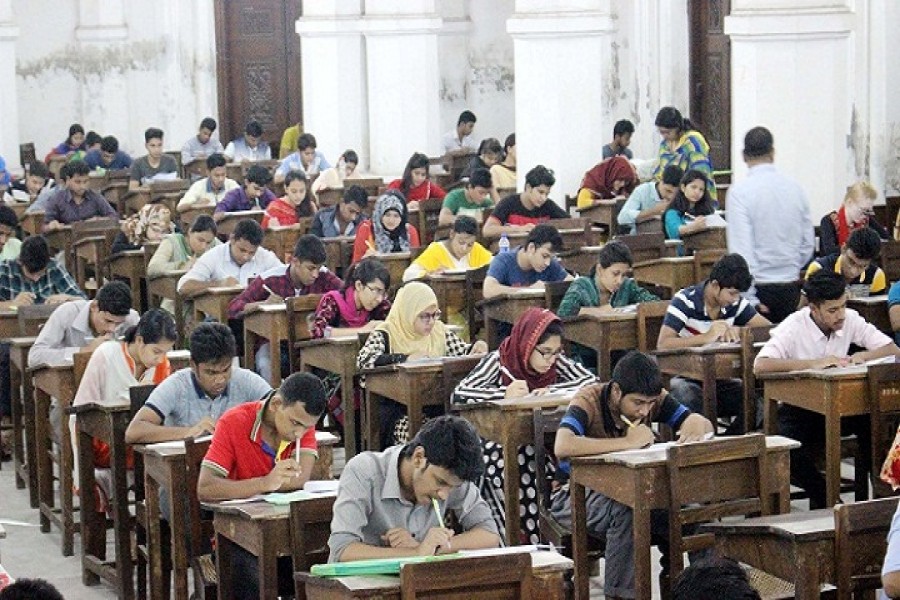That universities in the country rank poorly even in the Asian context does not go well with the people. But how the administration of the highest seats of learning reacts to this is perhaps more important than how the ordinary people do. At this level vice-chancellors lead the administration and their leadership decides the outcome of academic, research and related endeavours. Ever since the establishment of the country's premier highest seat of learning in 1921, the University of Dhaka, public universities have followed the British system of higher education. The quality of higher education was on a par with the world's best even from the start of the DU's journey.
If the same could be said about the standard of higher education here now, the nation would have been immensely proud. True, public universities have fund constraints. One of the common complaints is that not enough allocation is made for research. This too is irrefutable. In case of Dhaka University, research allocation is getting slashed for the past two years. Only Tk 95 million has been allocated exclusively for research in the 2020-21 DU budget. This amount will be shared by 56 departments, projects and centres of the DU. This year's budget for education and research constitutes 4.7 per cent as against 5.04 and 6.66 for the year 2019-20 and 2018-19. But surprisingly in the 2019-20 fiscal year, Tk 408 million was allocated for education and research, of which the university could use only Tk 287 million.
Evidently, when research components get so neglected at the premier university which is way ahead in ranking compared to others in this country, the overall research environment in universities can be imagined. The universities that form the Ivy League in the world excel in research, innovation, application of outputs in technological, business, communication and medical science's advancement. The paltry sum allocated here for research can in no way compete with even the research programmes undertaken by the Asia's best. But when there is a lack of interest in spending the amount allocated, it reflects the research environment in universities.
True, the country's resource constraint has held back its creative urges to some extent but that is not the last word. With the country making big strides on the economic front, pursuance of research should now be commensurate with the resource growth. But along with shortcoming in leadership, an even devastatingly negative development in the education sector is pushing academic and research ambitions down.
The latest report that the Ministry of Education has served show cause notices (12 such letters) on the vice chancellor and others of the University of Rajshahi to explain why the registrar, pro-vice chancellor, five teachers and an administrative official involved in contravention of the 2015 recruitment policy will not be terminated from their respective positions. In fact the VC, now in his second term, his first tenure ending in 2013, in collaboration with this coterie allegedly changed the recruitment policy in his comeback year 2017. This opened the avenue for recruitment of below par candidates based on unalloyed nepotism. In all 34 such candidates were reportedly appointed through the loopholes created in the new recruitment policy. The registrar has been found guilty of non-cooperation with the UGC (University Grants Committee) at the time of conducting its probe.
Most of the charges brought against the VC were found factual by the UGC. The VC was, moreover, guilty of illegally occupying a house on the university campus. Thus he has caused a financial loss of Tk 0.561 million to the RU. The education ministry has ordered the VC to reimburse the money.
Well, the money can be reimbursed but what about the irreparable damage caused by the illegally recruited substandard teachers? When a first class first candidate with first divisions or similar CGPA (cumulative grade point average) in earlier exams was ignored in preference for two other inferior candidates for recruitment in the university's law department, the extent of irregularity and compromise on quality can easily be gauged.
The education ministry has ordered postponement of all appointments until further order. Such moral turpitude on the part of a VC and others in high positions is least expected. But the fact is politicisation of university administration has long vitiated the academic atmosphere. For a long period, autocratic rulers and anti-liberation forces turned the campuses into zones of turf wars. Most of the public universities are yet to recover from that notorious legacy.
The authorities of other universities may not be blamed for blatant administrative irregularities, nepotism and financial malpractice but so far as recruitment of teachers and officers is concerned, the best qualified do not always stand the chance of appointment, if there is a competitor with the identical political leaning of the appointing authority. Quite a few newly established universities and the Jahangirnagar University suffered repeated face-offs between both teacher and student groups over VCs' alleged mismanagement.
Apart from universities, medical colleges have made news throughout the past year or so for financial scandals. In most cases principals of medical colleges were accused of procurement irregularities. A few of those principals had to resign or were terminated in such cases.
If this is how the heads of the highest institutions responsible for guiding and encouraging young talents to learning excellence and landing on the frontier of new knowledge and its practical application behave, universities will never be able to raise their standards. New vision and commitment on the part of VCs are warranted at a time when the world is preparing for the fourth industrial revolution. Education is one area where lies the answer to the multifarious challenges facing a planet of rising temperature.


